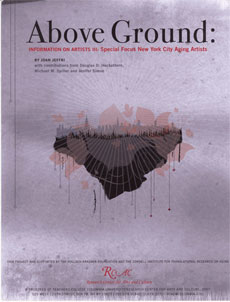A recent study conducted by TC's Joan Jeffri, has shown that aging artists, unlike the stereotype of people becoming more isolated as they age, tend to remain passionate, display high self esteem and life satisfaction. Artists stay engaged and productive well past retirement age, and if given the chance to select their profession over again, would not choose differently.
A recent study conducted by TC's Joan Jeffri, has shown that aging artists, unlike the stereotype of people becoming more isolated as they age, tend to remain passionate, display high self esteem and life satisfaction. Artists stay engaged and productive well past retirement age, and if given the chance to select their profession over again, would choose to be artists.
The study, which looked at 213 visual artists ages 62 to 97, was undertaken to assess the needs of aging artists in New York City's 5 boroughs. It found that they "avoid traditional systems like retirement and exemplify a lifelong commitment to and engagement with their art." "These artists are resilient ... and can serve as a model for society at large," the study said.
A second phase of the study is to include aging artists in the performing and literary fields.
Joan Jeffri, director of the study, said the various artists were being looked at separately because she expected to find different results. "They behave very differently because of the kind of artists they are," she said.
For example, many dancers' careers effectively are over at 35, while some opera singers might be just beginning their careers at that age. However, she said, the study was finding that even those artists whose careers end early transition into other jobs successfully. Visual artists don't retire and the findings have implications for other freelancers.
The study entitled "Above Ground: Information on Artists III: Special Focus New York City Aging Artists" was conducted by the Research Center for Arts and Culture at Teachers College, with support from the Pollock-Krasner Founcation and the Cornell Institute for Translational Research on Aging. The full report and Executive Summary available in English, Spanish and Chinese will be released on December 3 on the Center's website,
www.tc.edu/rcac.
Published Tuesday, Nov. 13, 2007
